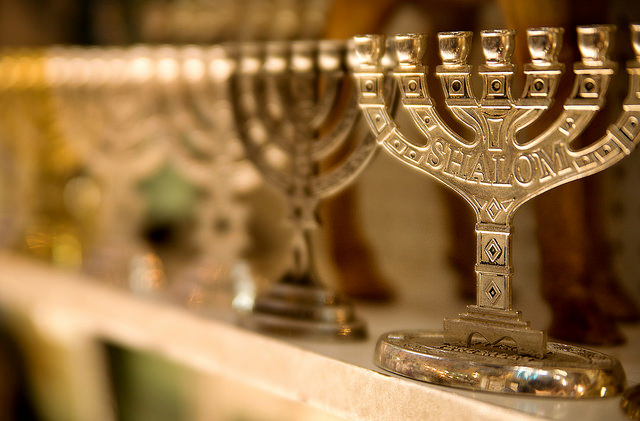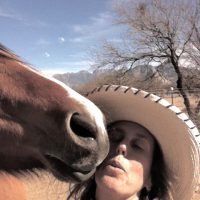
I was in my early 40s when I first asked my mother to find me a menorah.
It made her kvell when I asked. She was so happy, I’m pretty sure she dropped everything and ran to the store.
I have never followed my family’s faith. I ran from it from the time I was small. I actually told my parents that if they forced me to go to Hebrew school, I would run away. I don’t know why I had these feelings, but for as long as I can remember, I had what can only be described as an archetypal aversion to my given religion of Judaism.
It wasn’t even like my parents were that religious. We only attended the synagogue—which was actually a community center that had been transformed into a temple—about three times a year. But each High Holiday, we dressed in our finest and they would drag me with them, kicking and screaming all the way.
In grade school, I was invited to midnight mass with my best friend. I remember walking into the white stone church, the sound of our footsteps echoing through the cavernous space, and marveling at the statues of Jesus and the Virgin Mary, while simultaneously being swept away by the intoxicating scent of burning incense. And then the congregation lined up for the Eucharist blessing and received the wafers and wine. In comparison to the Jewish Community Center, this was incredibly mysterious and larger than life.
I was only 13 when I made the connection that it’s not safe to be Jewish.
We were living in New York and I had just gotten a work permit. There was a neighborhood bakery and it seemed like the perfect place to get my feet wet learning a trade. They hired me to help behind the counter.
My mom worked with me for a week, helping me learn to count change. I practiced for hours until I knew I could go to work without giving away the bank. I felt so grown up going to work on the weekends and everyone was so friendly. At the end of each day they would load up bags of the day’s goodies that hadn’t sold to share with my family.
For my 13th birthday, my grandmother gave me a tiny antique Jewish star. I treasured it because it was small, delicate and surrounded by a circle, so it didn’t look like a Jewish star. Until that point, I had been unwilling to wear anything that would signify my faith. There was something about this little star in a circle that felt ancient to me and despite my apprehension, I wanted to wear it.
I walked into the bakery wearing my birthday gift and the day began as usual, working with customers and filling boxes up with cookies and cakes. About mid-day, the owner asked me to work in the basement folding boxes. This wasn’t that unusual, but typically it was only for about 30 minutes at a stretch. I spent the remainder of the day downstairs in the windowless room.
Each day I arrived to work and was no longer invited to work with customers. I was immediately sent to the basement, where I folded boxes all day, until I found the courage to tell my mother what was happening. Without making a big deal about it, she told me I didn’t have to go back and I never did.
Whether the turn of events was a workplace coincidence or an anti-Semitic reality, my mind decided I had been right all along. It was better to hide and so that’s how I’d been living until the day I called my mother to tell her I wanted to light the Hanukkah candles. My mother called back the same day to share that she had found the perfect menorah for me. It was already in the mail.
When I opened the box I felt like the artist who made the beautiful ceramic piece had channeled my life.
It was a Chagall-inspired menorah and I had never seen anything like it. On the front side, there was a blue violinist floating in front of a white crescent moon, a young girl soaring through the clouds holding wild flowers and in the center, what took my breath away, was a big red horse. On the back, a young artist in a beret stands before the Eiffel Tower, an over-sized yellow and red chicken standing proudly by her side.
The horse held the most significance for me. How could my mother have known that they would return to my life 11 years later, to carry me through the grief of her loss?
What I understand now from this vantage point is that in my early rejection of my heritage, I carried deep unconscious fears about being “Jewish.” My great-grandmother Sarah, for whom I was named, was raised in the woods by a Gypsy family in Russia, after her family was slaughtered in the Pogroms. I don’t have conscious memories of knowing this story until I was 30 and my grandmother shared it with me, after I showed her photographs of the garden I had grown in my Colorado backyard. She told me how much I reminded her of her mother’s spirit, and for the first time I felt a deep connection to my roots. Somehow my life finally made sense.
Each year at this time, I light my menorah in honor of my ancestors and especially my mother, as more than anything it was tradition that was so important to her.
Because I was unwilling to learn about my history, I am actually flying blind when it comes to the holidays. Last year I found a song, complete with phonics, that I now sing when I light the candles. It helps me feel some connection to the tradition, to my relations and to the process.
I didn’t have official candles last night, but I was compelled to follow through with the promise I made to my mother to keep her tradition alive. So I lit a tea light and placed it in front of the menorah. Today I will find some proper candles and burn them in her memory.
In my life I have embraced many forms of spirituality and have woven them into my daily life. My altar is fluid and ever changing. So to those of you who celebrate—and for those who may not—let there be light and peace all around the globe.
Prayer-eoke: First Chanukah Candle Blessing.
Relephant read:
Why Christmas is not just for Christians: 10 “Christmas” Traditions that are Actually Pagan.
Author: Sheri Gaynor
Editor: Nicole Cameron
Image: Israel_photo_gallery/Flickr










Read 6 comments and reply